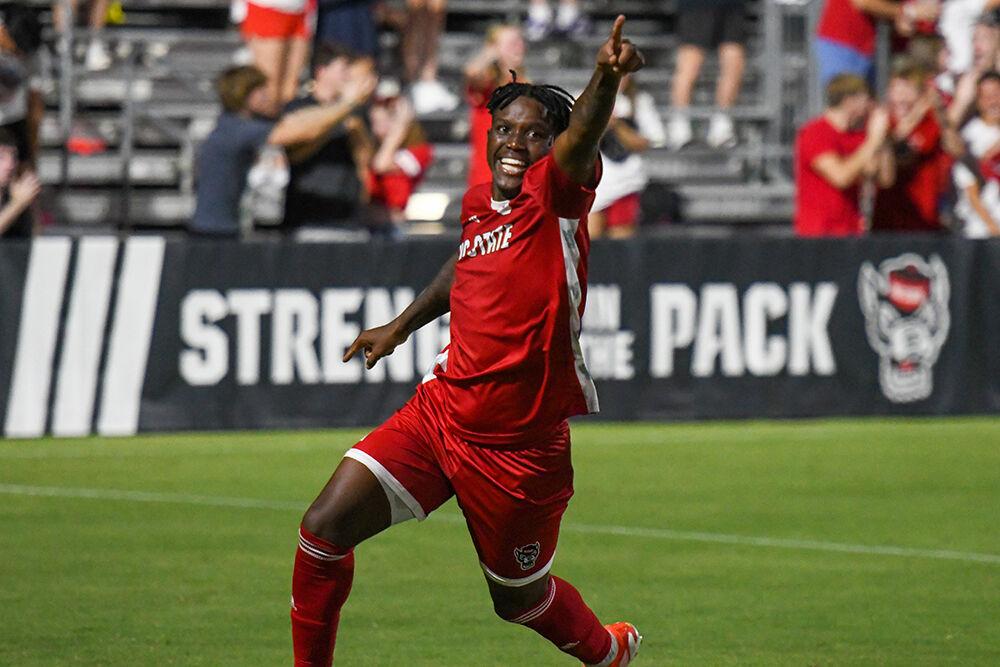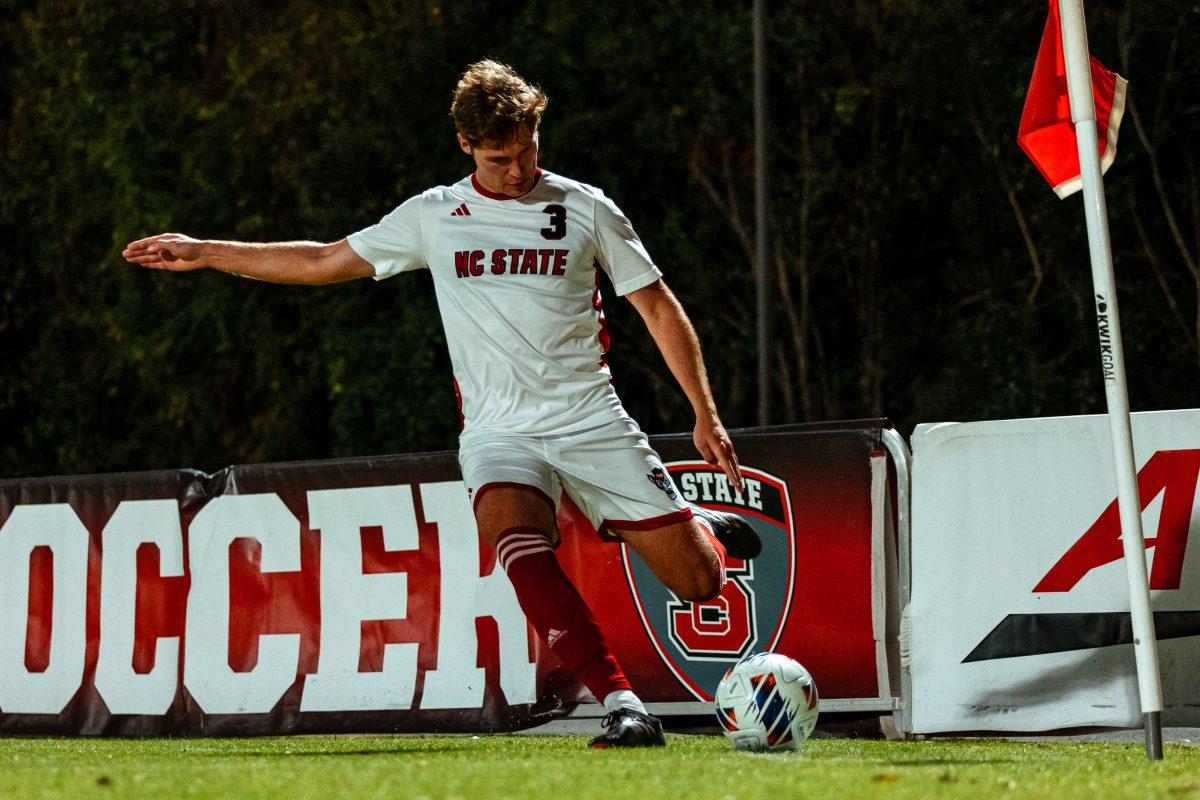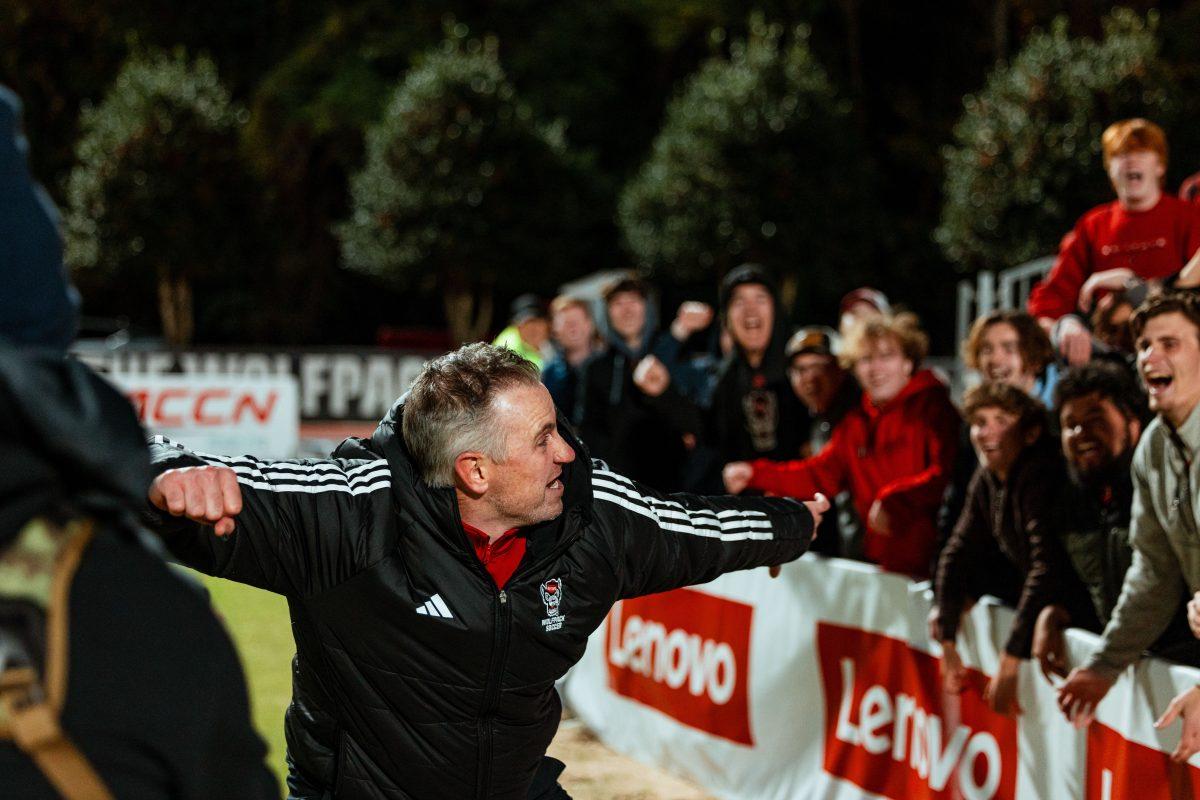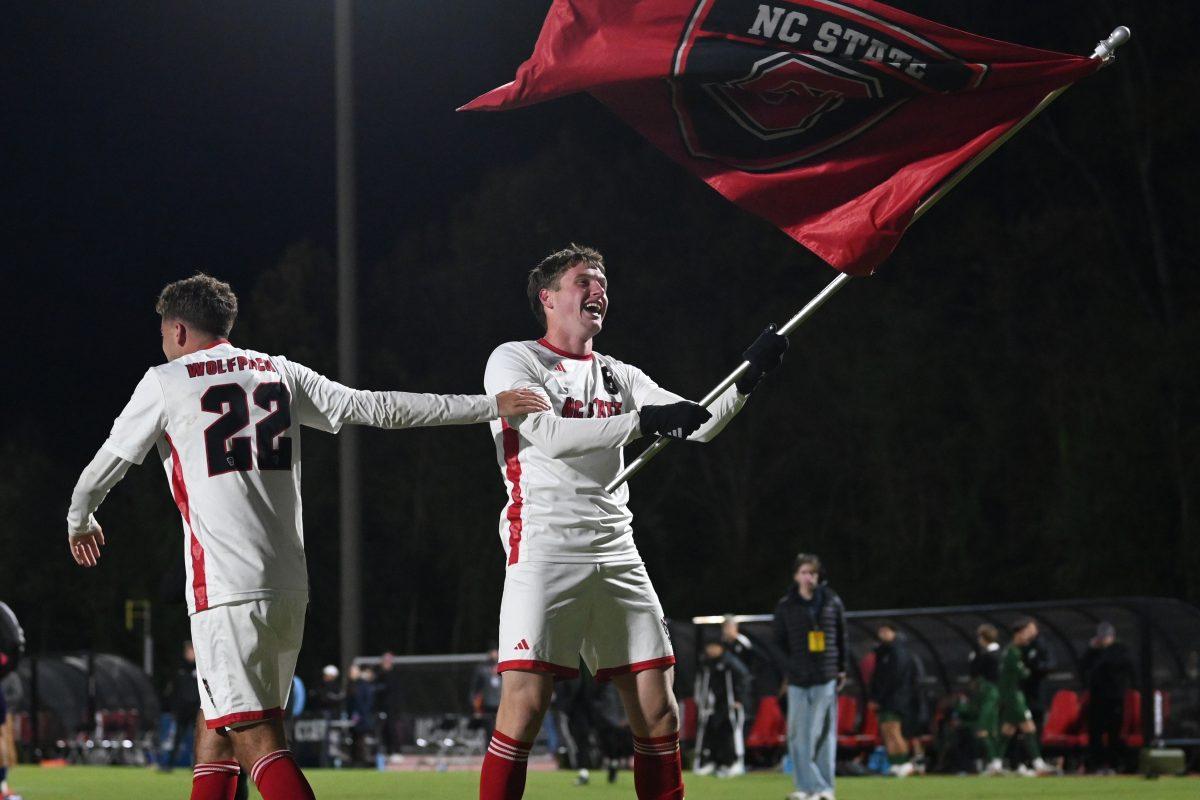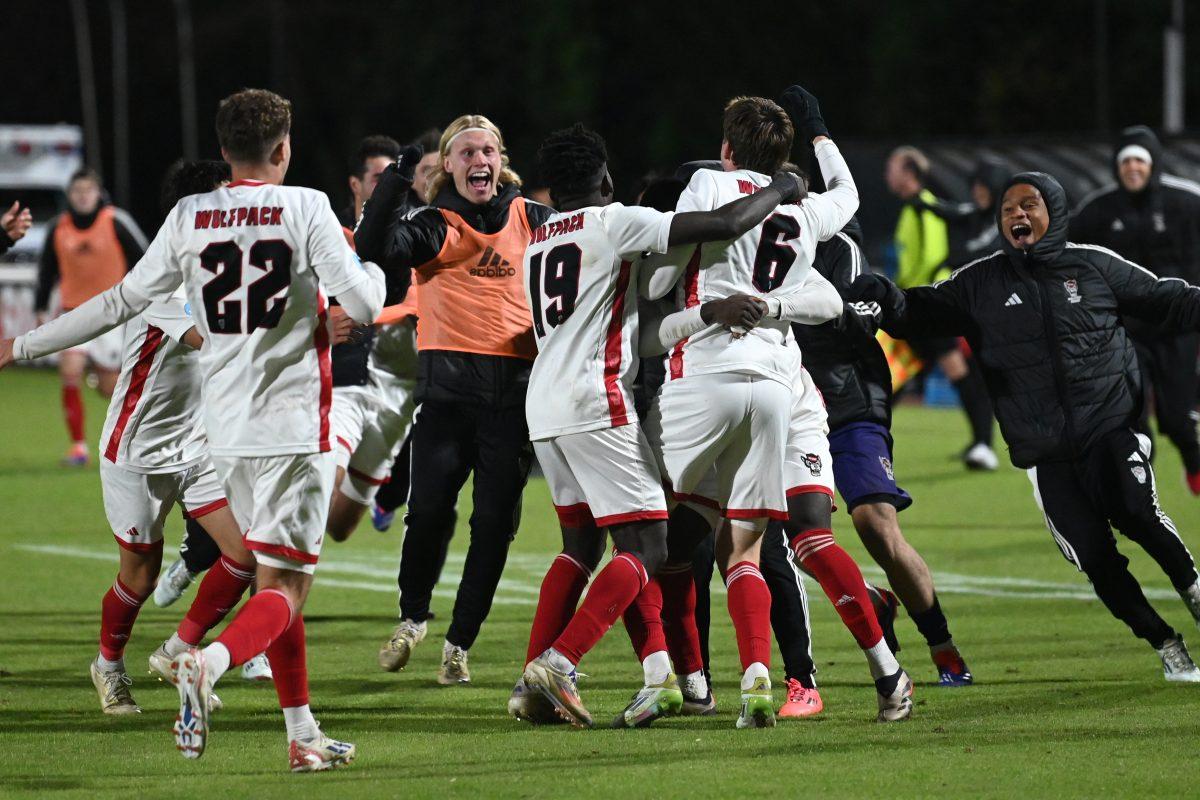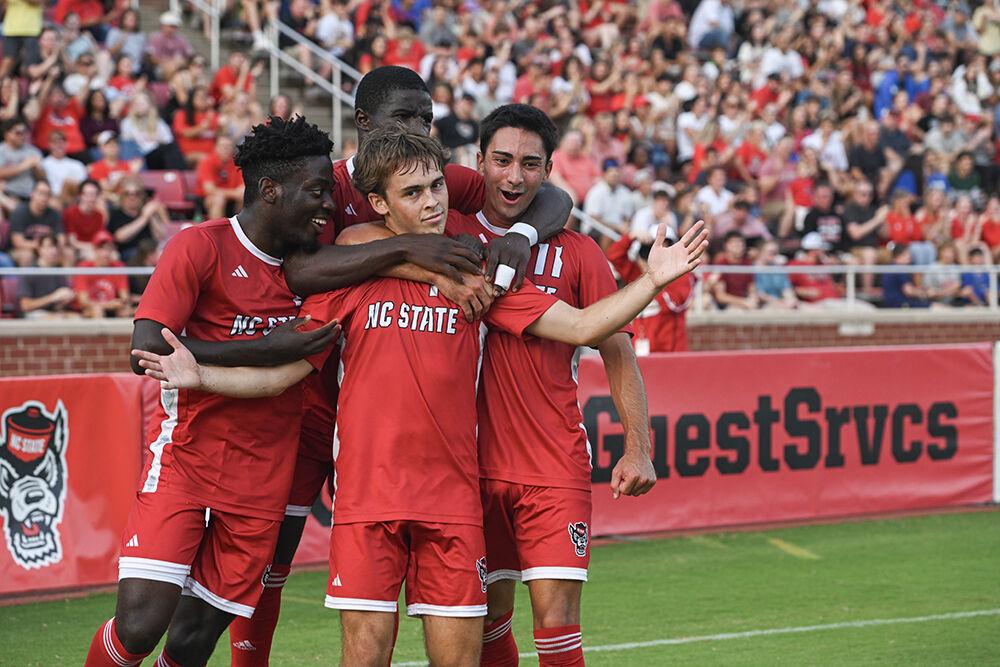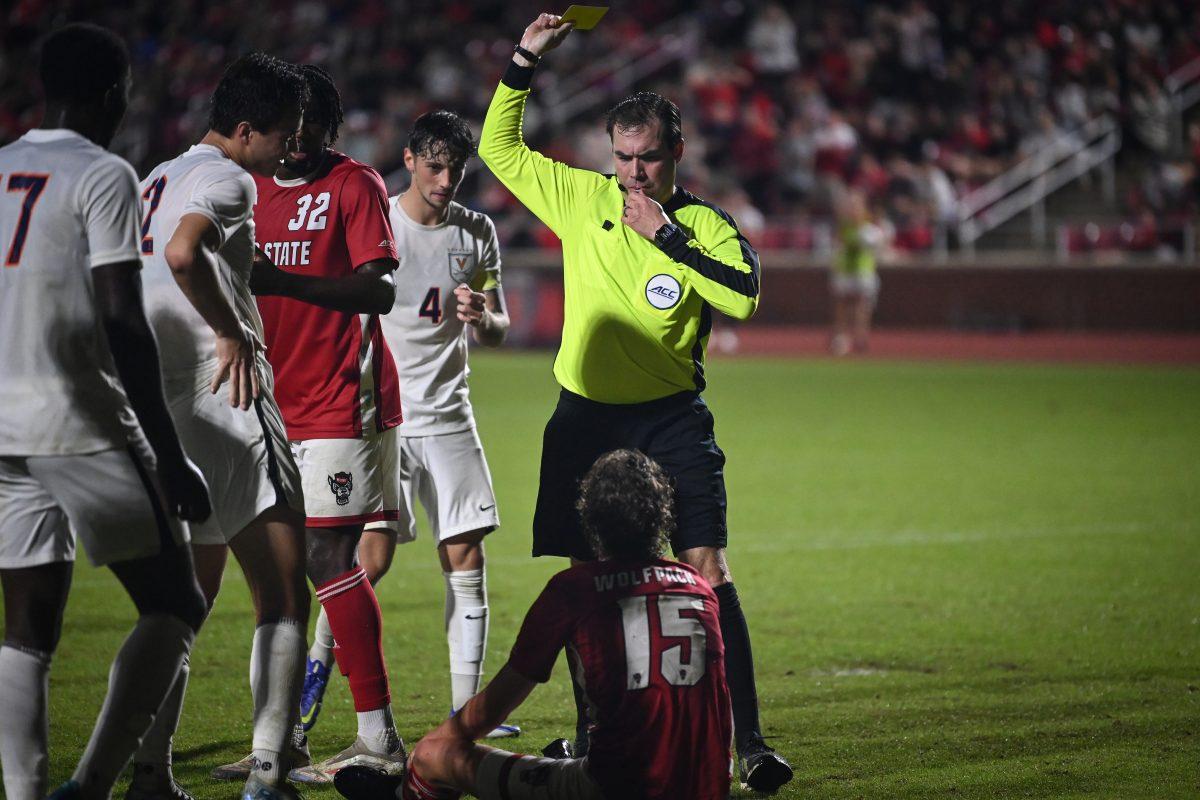After NC State men’s soccer senior midfielder Vusumzi Plamana scored his first collegiate goal in the 88th minute to secure a season opening 3-2 win over High Point, his teammates tried to mob him in celebration, but Plamana only wanted to celebrate with two people.
While his teammates tried to chase him down, Plamana pointed toward the stands at Dail Soccer Stadium and ran over to Erik and Melissa Hall.
Once the senior midfielder made it to the bleachers with his teammates close behind, Plamana embraced the Halls. Erik and Plamana joked in the past that when Plamana scored his first goal they would dance to embarrass Melissa, but in this moment, all Plamana wanted to do was hug them.
“In that moment, the emotions took over,” Plamana said. “It was a game-winner essentially, and then the only thing I could think of was just family and go over and celebrate and give them a hug.”
It was so important for Plamana to celebrate with Erik and Melissa first because of their impact on him two years after his life changed forever.
When Plamana was nine years old, his mother and father died within a month of each other.
Plamana’s mother died of a heart attack, something Plamana believes was caused by the stress of his father being in and out of the hospital to treat diabetes.
“I think that took a toll on my mom,” Plamana said. “She was stressed and she happened to have a heart attack.”
A few weeks after his mom died, Plamana and his half-brother were getting ready for school when his half-brother was called into another room. He didn’t hear the conversation, but when Plamana, his little brother and half-brother were walking to school later that morning, Plamana could tell something was off.
Plamana said while his half-brother was initially told not to say what happened, he gave in and told them that their father died of complications with his diabetes.
Plamana recalls crying on the way to school that day not knowing who was going to take care of him and his 6-year-old brother. After his father’s funeral, his aunts and uncles had conversations about who was going to take in Plamana and his brother. It was his dad’s older sister who adopted Plamana and his little brother, moving them from the Eastern Cape to Cape Town, South Africa.
For the next two years, Plamana lived with his aunt, learning English by watching soccer games on TV. During that time Plamana put a lot of his focus into getting better at soccer and avoided some of the things other kids his age fell into.
“It definitely helped me a lot,” Plamama said. “It helped me in terms of staying off the streets because in South Africa it’s easy to be part of gangs, get caught up in the wrong crowds and all these things and end up using drugs and all these kinds of violent things. That could have been the easy excuse because it’s like, ‘I’m hurting.’ I could’ve just gone into one of those things but football helped me be happy. It was like an escape basically.”
It was in the streets of his aunt’s neighborhood where Plamana’s skills were first noticed. His aunt would host neighbors to watch soccer games and many of them mentioned that they’d seen Plamana playing soccer on the road and were impressed with his ability.
One day Plamana’s uncle came back from work and his coworker mentioned that Plamana should sign up for the Devonshire Rovers, a football club in Cape Town.
When Plamana showed up at the club they asked him what position he played and at the time he was still working on his English so he told them the only position he knew in English — striker.
Plamana joined the club but could only afford to pay for taxi rides to games, causing him to miss out on practices leading up to games. As a result, Plamana came off the bench for his first game and was subbed in when the game was tied 1-1. Just after he entered the game, Plamana received a through ball from his teammate and in his words, ‘smashed it top corner’ for the lead and went to the corner flag to celebrate.
For the next two years, Plamana developed into one of the best players in his region and scouts from bigger clubs came up to his games. Casey Prince, the co-founder and executive director of the Ubuntu Football Academy, remembers the first time he saw Plamana play.
“He kind of stood out,” Prince said. “His ability was pretty obvious, but also just his personality, even as an 11-year-old, it was pretty unique. He just had this sort of confidence and swagger that was different than the other kids.”
Plamana also recalls the first time he met Prince. It was after the Rovers lost a game 3-1 and he spotted Prince wearing a big puffer jacket. When he saw Prince in that jacket, Plamana knew he was a serious scout. He remembers thinking to himself, ‘I’m going to the league’ when he spotted Prince.
That day, Prince offered Plamana an invitation to a trial for Ubuntu. When Plamana arrived at the trial both of his cleats were broken. He taped them up and planned to tell a coach 15 minutes in that his cleats broke so he could get new ones.
So 15 minutes into the trial, Plamana alerted a coach that his cleats broke and the plan worked to perfection.
“The first day I did the trick with my boots, and then it worked, and then they gave me boots,” Plamana said.
After the trial, Plamana wasn’t told if he had made the academy but soon after he returned home a coach came by his aunt’s and offered Plamana a spot at Ubuntu.
That’s where the Hall family comes in.
Ubuntu was located too far for Plamana to make the trip every day, and the academy was still in the process of building a residence, so Ubuntu had host families for kids that lived further away. Plamana was matched with the Halls.
“I felt immediately part of their family,” Plamana said. “They showed a lot of love and care for me, and then that really impacted me. It impacted the person that I am today as well.”
Plamana lived with Erik and Mellisa for the next 18 months while the residence was built and Prince believes that time had a major impact on who Plamana has become.
“I think that first 18 months with the Halls was really formative,” Prince said. “He really discovered his faith in that period or really solidified it. I think he also learned study habits and just a different way of doing things by being in a really stable and loving family environment after having had that loss.”
Plamana enjoyed living with Erik and Melissa so much that when the Ubuntu house was finished being built in January he still lived with them for the next six months until they had to move back to Raleigh.
Once Plamana moved into the Ubuntu residence he stayed there from age 13 to 18 where he developed as a soccer player and a person.
“Our mission is to holistically develop elite footballers towards becoming citizens of significance,” Prince said. “We’re all about unleashing their full potential in every possible area, preparing them for platforms of influence in and out of the game, and then helping them discover their purpose.”
While Plamana was at Ubuntu, he realized that there was more to him than just the game of soccer.
“Understanding that football is not your whole identity,” Plamana said. “Football is a sub-identity, it’s part of your life. I’m Vusumzi. Vusumzi loves football, but Vusumzi also loves business.”
When Plamana realized that soccer was just one aspect of his life, he decided that the college route was the best for him. Despite having offers from every pro club in South Africa, according to Prince, Plamana wanted to get an education while playing the game he loves.
“I think he had a different sort of maturity in terms of just knowing he should pursue his studies first,” Prince said. “So I think getting the opportunity here wasn’t really a question, it was unique for him to say, ‘I know I can be a pro here, but I’m actually choosing the U.S. route.’”
When deciding what college to play for, Plamana had no idea where NC State was. He had no clue that Erik and Melissa Hall lived in Raleigh. At the time he just liked what the school had to offer and the opportunity to play for a collegiate soccer team.
“God was kind of like, ‘Hey, this is the pathway that I’ve laid out for you,’” Plamana said. “Because it’s one of the things, when I look back, I’m like, ‘Wow, how did I end up at the ACC?’ Because if you look at my story and my life, it’s like, ‘No that’s not supposed to happen.’ You don’t go from what this boy is going through to playing in the ACC and being able to get a degree in America coming from a country in Africa.”
Now, Plamana is in the midst of his final season at NC State and is set to graduate this winter. He’s playing a key role in the Wolfpack’s best start since the 2012 season, logging the second-most minutes on the team while being one of the squad’s most vocal leaders.
Once the season ends, Plamana still hopes to play professionally in either the United States or Europe, but he won’t forget his roots while chasing his dreams.
“What I’ve seen Ubuntu do with me is something that I have missions of doing as well and that’s why I feel like going to pro football will provide me with the platform of being able to touch many other lives,” Plamana said. “Ubuntu holds a special place in my heart. I am where I am right now because of the opportunities they provided for me.”


